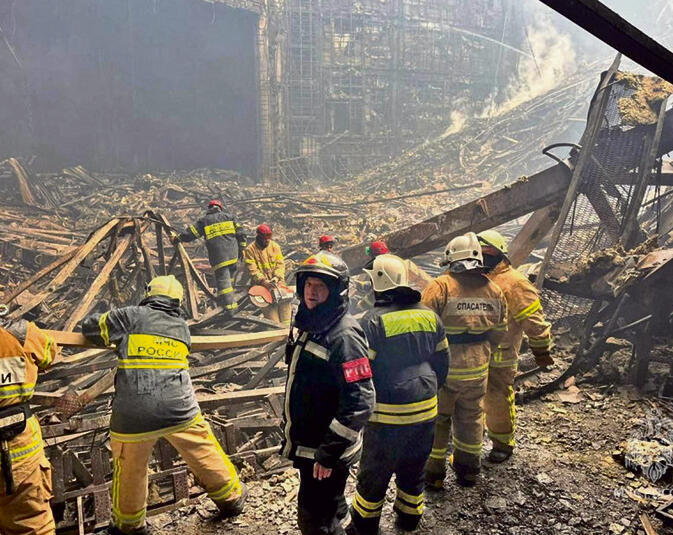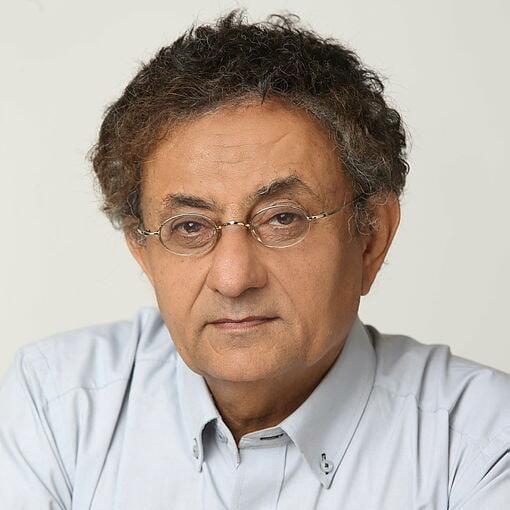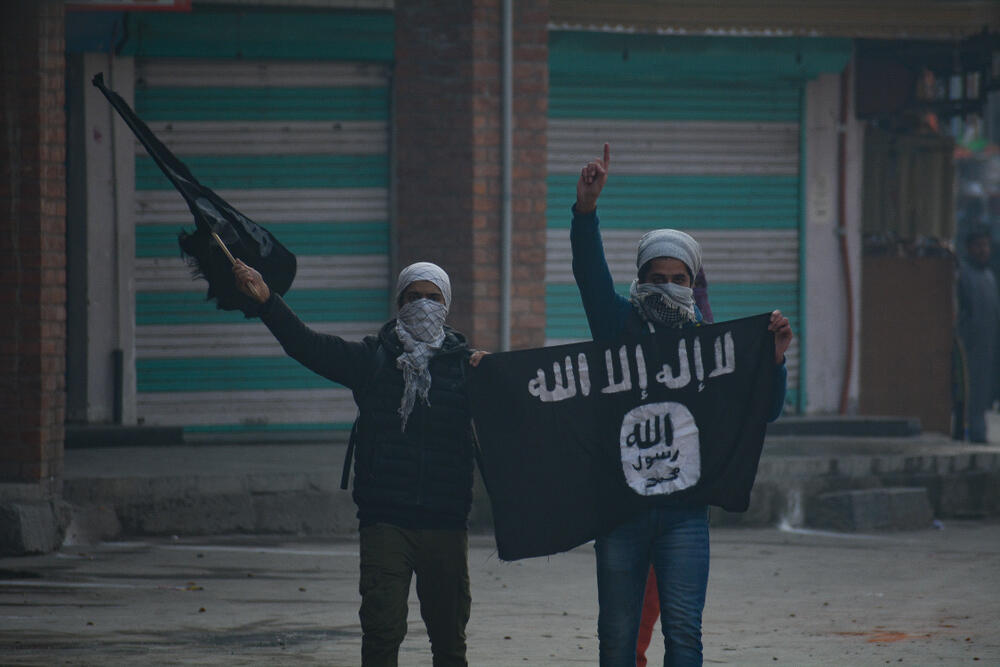Getting your Trinity Audio player ready...
Since when do radical Muslims have it in for Russia? Finding logic in the terrorist actions of radical jihad proves challenging. Take, for instance, the recent attack in Iran by an Islamic State faction during a memorial for slain Quds Force commander Qasem Soleimani. Over 200 lives were claimed in this brutal act, all devout Muslims who could have easily been Islamic State sympathizers themselves. Some may write it off as a Sunni-Shiite conflict, but radical Islam defies such simplistic narratives. It's a death industry, driven by the desire to instill fear and recruit more followers to the cause.
Read more:
Russia's sizable Muslim minority, nearly ten million strong and comprising about 6.5% of its total population, adds complexity to the equation. Comparable to France and Germany, Russia has its share of radical elements, as seen in regions like Chechnya and Dagestan.
2 View gallery


Rescuers at the charred remains of the Crocus City Hall in Moscow Oblast, the site of a deadly Islamic State attack that has claimed the lives of over 150 people
(Photo: Russian Emergencies Ministry)
Despite lacking international oversight like the ICC and the Human Rights Council, Russia has faced its own battles against terrorism. The Chechen conflicts of the 1990s saw tens of thousands perish, with Russian forces eventually prevailing after the Chechen leader ultimately switched allegiance.
Yet, radical Islam persists, with Islamic State operatives infiltrating former Soviet Muslim republics. Notably, many Chechens have joined IS, earning a reputation for their brutality. Amid their animosity toward those outside their ideology, they reserve a special disdain for Russia, viewing it as a symbol of Christianity and everything they oppose.
Seeking explanations that lean toward the contemporary rather than historical? Then direct your attention to a bustling epicenter often overlooked on the global stage. A notable shift in IS activity has steered toward Africa's Sahel region. Boko Haram, aligning itself with the Islamic State, has unleashed relentless violence upon Muslims and Christians in Nigeria for years.
Recent times have seen the emergence of an alliance of additional terror groups like Jama'at Nasr al-Islam wal Muslimin (JNIM), Islamic State in the Greater Sahara and others. These ruthless factions operate across Chad, Mali, Niger, Burkina Faso, Mozambique and beyond.
Three nations—Chad, Mali and Niger—have effectively distanced themselves from Western powers like France and the United States, pivoting toward Russia's orbit. In their battle against radical Islamists, they naturally lean on military support, procured through might and financial aid. While the extent of Russian assistance remains murky, one thing is evident: if further rationale is needed for Islamist hostility toward President Vladimir Putin's Russia, it stems not solely from domestic conflicts but also from Russia's active involvement in quelling Islamist uprisings in Syria and now the Sahel.
In Africa alone, Islamist outfits claimed 19,091 lives in 2022. Though data for 2023 remains is still pending, a grim truth emerges - the toll of death and destruction is escalating, this time with Russian involvement slipping under the international radar.
Amid this intricate web of interests, Russia extends support to Hamas, even hosting a delegation from the organization in Moscow barely three weeks after the harrowing events of October 7. It's worth noting that Hamas had previously stirred rumors of an alliance between its founder Ahmed Yassin, Osama bin Laden, Khattab and Shamil Basayev, with the latter two tied to radical Islam within Russia.
But does it truly matter? Despite Hamas being a longstanding player in jihadist factions that also target Russia, the love extended by Russia to Hamas remains unreciprocated by the jihadists toward Russia.
Jihad knows no geographical boundaries. To them, the world is their oyster, not just the Free World. It's a cancer spreading its cells everywhere. The most vulnerable suffer the most. There's hardly a nation untouched (short of a few Pacific islands, possibly), without dormant or ideological jihadist cells. They undoubtedly lurk in Russia and its neighboring republics.
We've witnessed the brutality of these radical Muslims in their attempt to lynch passengers from a flight arriving from Israel to Dagestan in late October. Russia's response was subdued, occurring just three days after a Hamas delegation visited Moscow. Even Hamas wasn't spared. No jihadi group makes exceptions, as jihadists don't compromise. Attacks by jihadists have also targeted Turkey, despite its affiliation with the Muslim Brotherhood and its past flirtation with IS.
And one can't ignore the Israeli perspective. Time and again, we hear the assertion that Islamist terror, especially Hamas, stems directly from the Israeli-Palestinian conflict, a claim amplified since October 7. These assertions are baseless.
After all, 95% of jihad victims are Muslims or inhabitants of impoverished nations. Did they wrong the jihadists? Are they seen as colonialists? Oppressors? Conquerors? The answer is clear.
Yet, the blame continues to be directed at Jews, Israelis or Zionists. The events in Moscow won't sway the stances of radical progressives who protest against Israel. However, they should serve as a stark reminder to everyone that jihad is a global menace. And anyone who opposes Israel ultimately aligns themselves with jihad.



